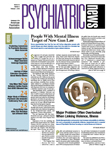One of APA's most important contributions to our profession has been the Diagnostic and Statistical Manual (DSM). The DSM is the ultimate reference used by psychiatrists and other mental health professionals not only in the United States but throughout the world to diagnose and classify mental disorders. Each edition represents the most up-to-date science and provides a base for appropriate clinical care, as well as further research on mental illness.
The preparation of DSM-V is under the direction of a task force (under which are topically related work groups), and the final product will be reviewed and approved by the APA Assembly before receiving official approval from APA's Board of Trustees. This column provides more background regarding the DSM appointment process—a process in which we have been pioneers in setting standards of disclosure and limits.
Members of the DSM-V Task Force were nominated based on recommendations of clinical leaders, the research community, and psychiatric subspecialty and other health and mental health groups. They are research scientists from psychiatry and other disciplines, master clinicians, as well as consumer and family advocates. In addition, their experience includes a focus on basic medical science, genetics, epidemiology, statistics, and public health and in subspecialties such as child and adolescent psychiatry, addictions, geriatric psychiatry, ethics, and cross-cultural issues.
The APA Board of Trustees is committed to assuring that DSM is as free as possible from any bias and potentially conflicting relationships with entities that have an interest in psychiatric diagnoses and treatments. Disclosure of real or perceived potential conflicts has become the standard of journals and other medical publications. For DSM-V, however, it was insufficient merely to disclose competing interests; rather, APA needed to determine what the limits of such relationships should be.
Consequently, we looked at procedures of other medical specialties, medical journals, medical organizations such as the Association of American Medical Colleges (AAMC), and the federal government, including the National Institutes of Health and the Food and Drug Administration. We understood that almost two-thirds of medical research in this country is funded by industry—the government and foundations provide the remainder—and that clinical science is dependent on nongovernmental funding. We recognized t hat ever yone has some competing personal or professional interests, not all of which are financial; we also were aware that whatever criteria we endorsed for disclosure, limits, and divestiture could be perceived as arbitrary. Some APA members advocated for allowing no current or previous industry support, while others stated that full disclosure would suffice. After considerable discussion, we adopted a more stringent standard than that of federal agencies or the recommendations of the AAMC.
Full disclosure of income from all industry sources is required for the three calendar years prior to appointment; income limits were set beginning in calendar year 2007 and continue for the duration of each member's work on DSM. These limits require that each member's total income from industry sources (excluding unrestricted research grants in which the researcher has total control over the content and implementation of the research program) would not exceed $10,000 in any calendar year, and that stock or shareholdings (excluding blind trusts, mutual funds, and pension or retirement funds) would not be worth more than $50,000 total. We also prohibited appointees from participating in any capacity in industry-supported symposia at an APA annual meeting during their tenure (excepting those who had made a previous commitment for the 2007 meeting). While much attention was focused on financial relationships with industry, we also set limits on personal/professional relationships of participants to avoid other perceptions of influence or bias.
We also see these principles as a first step in fostering transparency and minimizing perceptions of conflicts, or real conflicts, and just as we require ongoing reporting by all DSM participants, we also will continuously review our principles to ensure the integrity of this important contribution to science and care. A recent APA review of appointees' disclosures demonstrated the complexity of funding psychiatric research and education, but also documented the accuracy of appointees' full disclosures.
We have been gratified at the willingness of leaders in the field to abide by these principles and to participate in DSM-V at some personal financial cost. Their commitment to the best science will ensure the best-quality product as well as the best patient care. ▪

